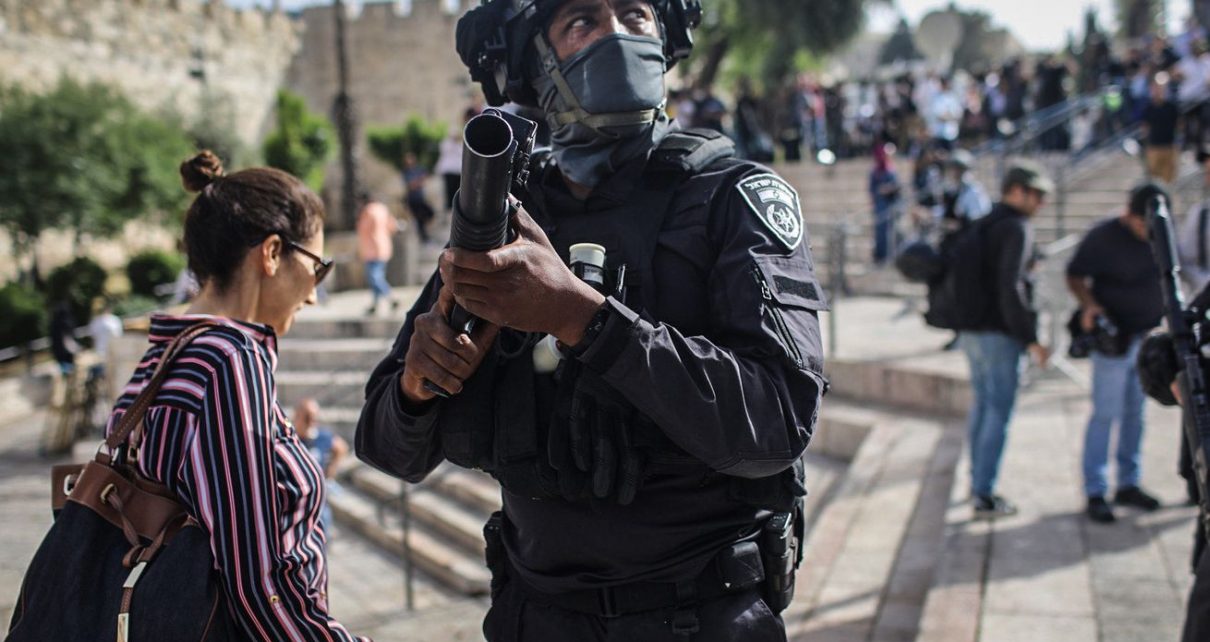
The Biden administration said it wants human rights at the “center” of its foreign policy. Now is its chance to prove that.
Weeks of violence in Jerusalem, sparked by Israel’s attempt to evict several Palestinian families from their homes in the Sheikh Jarrah neighborhood of East Jerusalem, have Democrats, activists, and experts calling on President Joe Biden to speak out forcefully against the American ally’s actions.
The problem is he and top members of his team are unlikely to — potentially missing an opportunity to stem the violence and avert a broader conflict.
For decades, Israeli pro-settler organizations have aimed to push Palestinians in East Jerusalem out of their homes, dismantle their dwellings, and replace them with hundreds of housing units for Jews. It’s long been a source of simmering tension, and the anger grew to a boil in April as eviction cases continued in Israeli courts, leading Israeli police to increase their presence around the city and tussle with Palestinian protesters.
The standoff has produced troubling scenes, such as Israeli police on Saturday blocking buses of Palestinians traveling to pray at the al-Aqsa Mosque, Islam’s third-holiest site, for the holiest night of Ramadan.
But there was nothing like the crescendo of violence seen on Monday.
Far-right Israelis planned to march through the Muslim Quarter of Jerusalem’s Old City, a provocative annual tradition that celebrates the Israeli capture of East Jerusalem in the 1967 Arab-Israeli War — a day known in Israel as Jerusalem Day. But Palestinians don’t like the event because they claim East Jerusalem, which Israel annexed, as the future capital of their sovereign state.
Anger at the parade led to intensified conflict between Palestinians and Israeli authorities.
On Monday morning at al-Aqsa Mosque, stone-throwing Palestinians took on Israeli police firing rubber bullets and stun grenades. Roughly 330 Palestinians were injured, local health officials said, with 250 hospitalized from the fight.
אלימות תוך כדי מעצר בהר הבית. pic.twitter.com/JWwhGZ5EO0
— نير حسون Nir Hasson ניר חסון (@nirhasson) May 10, 2021
Then, on Monday evening, Hamas, the Islamist militant group that has ruled Gaza since 2007, fired seven rockets into Israel — with some even setting off air raid sirens in Jerusalem. One rocket reportedly fell just to the west of the capital, damaging some houses.
The threat of rocket fire was so real that Israel’s parliament, the Knesset, had to evacuate while in the middle of a session.
Abu Obeida, a spokesperson for Hamas’s military wing, said the rocket attack was retaliation for what he called Israel’s “crimes and aggression.”
“This is a message the enemy has to understand well,” he continued. Hamas had given Israel until 6 pm local time to move its police forces out of the Aqsa mosque compound.
This is the moment Israel’s parliamentary chamber was evacuated after rockets were fired towards Jerusalem. pic.twitter.com/bcpUkkKUrQ
— Raf Sanchez (@rafsanchez) May 10, 2021
Health officials in Gaza afterward said explosions in the region killed 20 people, including three children, and injured around 65 others. The Israeli military later confirmed it had carried out strikes in Gaza.
In response to the continuous rocket fire from the Gaza into Israel, we have now struck numerous Hamas terror targets in Gaza, including:
2 rocket launchers
2 military posts
8 Hamas terror operativesTerror targets civilians. We target terror.
— Israel Defense Forces (@IDF) May 10, 2021
Though militants in Gaza sporadically fire rockets into Israel and are met in turn by Israeli airstrikes, the current tensions have some worried this latest exchange could be the beginning of a larger fight.
In a speech, Netanyahu accused Hamas of having crossed a “red line” with the latest rocket attacks and promised a tough response. “Whoever attacks us will pay a heavy price,” he said, warning that the fight could “continue for a while.”
The Biden administration has said it’s concerned about the violence in Israel and denounced Hamas’s rocket attacks as an “unacceptable escalation.” But some are calling on Biden to take a more forceful stance and condemn Israel’s actions in East Jerusalem.
That might not happen, though, as experts note the political costs of calling out Israel far outweigh the benefits of sticking to the president’s nominally human rights-centered foreign policy.
Biden wants human rights at the center of his foreign policy. Israel is a test.
In February, Secretary of State Antony Blinken said the Biden administration would place human rights at the “center” of US foreign policy. “The United States is committed to a world in which human rights are protected, their defenders are celebrated, and those who commit human rights abuses are held accountable,” he said.
Calling out Israel’s attempted eviction of Palestinians is the perfect time to show the administration means what it says, experts say.
“The world is watching; this issue is important,” said Shibley Telhami, the Anwar Sadat professor for peace and development at the University of Maryland. “The administration needs to show it isn’t all talk. They have to demonstrate this principle when it’s hard, not when it’s politically costless.”
The US has already made statements on the issue. Last Friday, State Department spokesperson Ned Price said, “We call on Israeli and Palestinian officials to act decisively to deescalate tensions and bring a halt to the violence.” Two days later, the White House published a readout of National Security Adviser Jake Sullivan’s call with his Israeli counterpart in which he said the administration has “serious concerns about the events in Jerusalem.”
But that’s too small a gesture for many, who say it’d be more significant for Biden — or at the very least Blinken or Sullivan — to denounce Israel’s actions on camera.
J Street, an Israel-focused liberal advocacy group, released a Monday statement urging the Biden administration “to make clear publicly that Israeli efforts to evict and displace Palestinian families in East Jerusalem and the West Bank are completely unacceptable to the United States, as is the continued use of intimidation and violent, excessive force against Palestinian protesters and worshipers — especially during Ramadan.”
Some Democrats in Congress are also putting pressure on Biden.
Sen. Chris Van Hollen (D-MD), a member of the Senate Foreign Relations Committee, tweeted on Saturday: “If the Biden Administration puts the rule of law and human rights at the heart of its foreign policy, this is not a moment for tepid statements.” He also linked to a statement by the United Nations high commissioner for human rights that said the evictions could be a “war crime.”
As this makes clear, evictions of families in East Jerusalem would violate international law. If the Biden Administration puts the rule of law and human rights at the heart of its foreign policy, this is not a moment for tepid statements.
https://t.co/BQbBZYhjuJ— Senator Chris Van Hollen (@ChrisVanHollen) May 9, 2021
Sen. Bernie Sanders (I-VT), a progressive leader in Congress, tweeted something similar: “The United States must speak out strongly against the violence by government-allied Israeli extremists in East Jerusalem and the West Bank, and make clear that the evictions of Palestinian families must not go forward.
Lawmakers in the House, including “Squad” members Alexandra Ocasio-Cortez, Ayanna Pressley, and Rashida Tlaib — a Palestinian American — also backed the Palestinian cause.
Hundreds of Palestinians are on the verge of being kicked out of their homes by the Israeli government right now.
Join me in demanding that Palestinians be able to remain on their own land. Sign petition to #StopJerusalemExpulsions & #SaveSheikhJarrah https://t.co/ofP9aYWBkq
— Rashida Tlaib (@RashidaTlaib) May 7, 2021
Biden and other prominent members of his administration so far haven’t openly blasted Israel, instead choosing to condemn the actions of both sides. The University of Maryland’s Telhami said there were good reasons for that, namely that Biden needs Jerusalem’s support to reenter the Iran nuclear deal and the fact that the Israeli-Palestinian issue isn’t top of mind for most Americans.
Still, he said, “the problem here is the public profile. When something like this happens, you have to put your foot down.”
But the administration is unlikely to, the Middle East Institute’s Khaled Elgindy told me. If they were going to denounce the Israeli government harshly, he said “they would’ve done it by now. Why would they suddenly have a moment of clarity?”
Experts said there were other ways Washington could rebuke Jerusalem, such as sanctioning Israel or curbing weapons sales, but none expect any of that will happen. When it comes to the US defending human rights, “Palestine is usually the exception,” said Elgindy, who served as an adviser to Palestinian leadership from 2004 to 2009. “Who’s going to push the Israelis on human rights? It’s not going to be the US.”
While inaction is expected, it’s no less problematic, he continued. With no one forcefully and openly calling for an end to the violence, the situation “could very quickly escalate to something that looks like 2014.” A fight that year between Israel and Hamas saw more than 2,100 Palestinians and 71 Israelis killed while over 10,000 people — mostly Palestinians — sustained injuries.
If that happens, Elgindy concluded, the US “will have no choice but to get involved.” The irony there is it’s possible Biden’s inaction now could see him wade deeper into a growing conflict down the line.
Israel is already showing no sign of backing down. “Israel has no other choice but to defend its citizens from these indiscriminate attacks,” Gilad Erdan, Israel’s ambassador to the US, said in a Monday statement.
And neither is Hamas. Obeida, the spokesperson, said more attacks will come if Israel goes into the Aqsa mosque area again or evicts Palestinian families.




